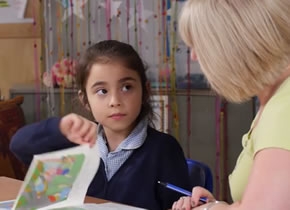
Request a full Catch Up® information brochure and details of our free information webinars
Find out more
In Catch Up® Literacy Assessment 5 (Spelling knowledge), should we test if children can spell words that they couldn’t read in Assessment 2 (Sight word knowledge)?
What Catch Up® recommends is that when carrying out Assessment 5, you should only ask your learner to spell the words that he/she read correctly during Assessment 2: Sight word knowledge (the ‘ticked’ words).
So, for example, a learner who read 18 out of the 40 words on list 2 should only be asked to spell those 18 words (not the whole list).
The assumption is that a learner will not be able to spell a word that they can’t read.
What about ‘sampled’ words?
The only time that you would ask a learner to spell a word that they didn’t read during the assessment of sight word knowledge, is if you used ‘sampling’ for a word list (see p44 in the Catch Up® Literacy file). In this case – if they read all of the sampled words correctly – then the remaining words on that list are also treated as having been ‘read’ correctly, so all of those words would need to be checked during the spelling assessment.
So are there any occasions when spelling knowledge precedes reading knowledge?
You might think the answer to that is obvious and that the ability to spell a word comes after we have learned to read it. That is generally true but, back in 1980, Bryant and Bradley produced some very interesting research that showed that young children were systematically better at spelling some words than at reading them! The words they found easier to spell than read, were words that have a close grapheme/phoneme correspondence, in particular CVC words like ‘jog’ or ‘vet’ but which used less familiar letters of the alphabet (e.g. j, g, v).
So it seems that, in the very early stages of learning to read, the phonemic segmentation skills may develop ahead of the phonemic blending skills.
However, the study found that in words where the correspondence between graphemes and phonemes is less predictable, e.g. ‘they’ or ‘know’, children found it easier to ‘remember’ words for reading that they couldn’t reproduce for spelling. So, most of us are likely to be better at reading than spelling.
Another interesting aspect of the reading first/spelling first discussion is if children have problems with ‘reversals’, they may find it easier to spell a word than to read it. For example, few children will misspell ’no’ but many struggling readers will confuse it with ‘on’ when reading. Similarly, children rarely write the word ‘was’ when they mean ‘saw’ (although they will often muddle these when reading).
Catch Up® is the working name of The Caxton Trust, a not-for-profit charity registered in England and Wales (1072425) and Scotland (SC047557) as well as a company limited by guarantee (03476510). Catch Up is a registered trademark.
The Catch Up® Web site use "cookies" to help you personalise your online experience. A cookie is a text file that is placed on your hard disk by a Web page server. Cookies cannot be used to run programs or deliver viruses to your computer. Cookies are uniquely assigned to you, and can only be read by a web server in the domain that issued the cookie to you.
Click on the different category headings below to find out more. You can change your default settings very easily. To turn cookies on, click the button to the right. To turn cookies off, click the buttons to the left. Please read our cookie policy to find out more.
Performance monitoring cookies: Google Analytics cookies (_ga,_gid) - these can last up to 2 years.
Strictly necessary cookies used by the site content management system: PHPSESSID (used to record your logged in session) and allow_cookies (used to record that the user has consented to cookies) - these are either temporary (session) cookies or expire after no more than 30 minutes and are used to provide functionality as you navigate around the site and allow you to access secure areas.